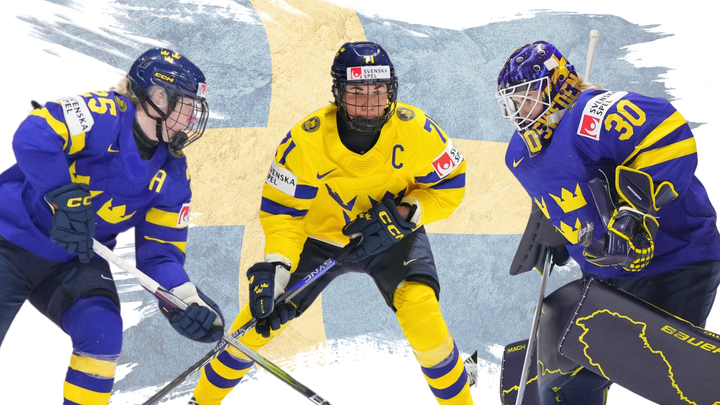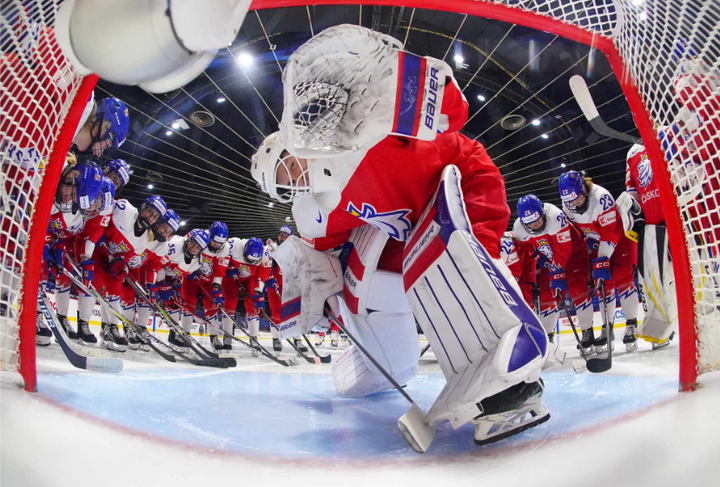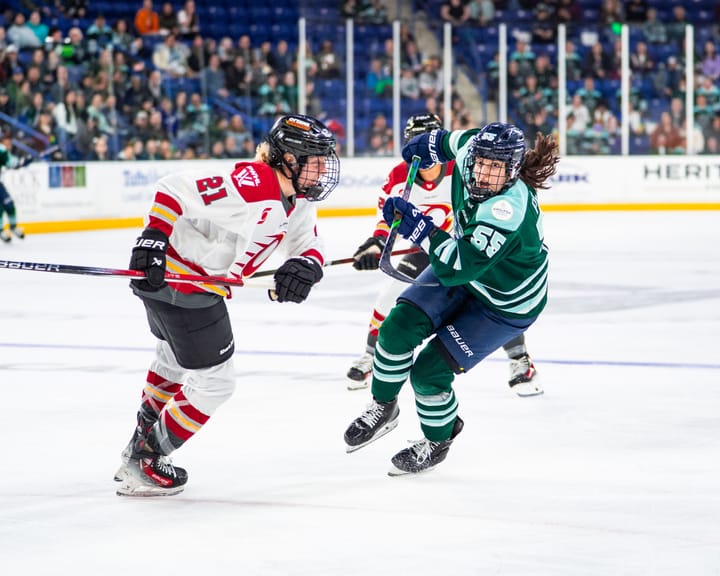Catching up with Noora Räty
Räty chats about her decision to go to China, her plans after hockey, and that one time she met David Hasselhoff.
Since Finnish goaltender Noora Räty has agreed to play for the CWHL’s new expansion team, she’s been a little busy. She’s done a few interviews here and there, but mostly her schedule has been filled by the goaltending school she helps direct, working with girls and boys from age eight through to college-level. The toughest are the 12- and 13-year-olds. “Their attention span is pretty short,” she says.
On June 5, she was at the Hockey Hall of Fame in Toronto for the announcement that Kunlun Red Star, a Chinese hockey organization that already has a team in Russia’s KHL, is expanding to the Canadian Women’s Hockey League. Räty and Kelli Stack, an American player, were the first big names to attach themselves to the club, which will have a bit of traveling to do over the course of next season.
Räty, 28, is considered among the best at her position — perhaps the best in the world right now. She played the last three seasons in a Finnish men’s league, the same league that saw Hayley Wickenheiser break ground by being the first woman to play men’s pro hockey. Räty’s move to men’s hockey came after she announced her retirement following the 2014 Olympic Games in Sochi, when there wasn’t a women’s league for her to join that paid its players. Now, though the CWHL hasn’t yet been able to pay players enough to call it a full-time profession, KRS is giving her the chance to play at the highest level of her sport while making a living and being an ambassador for a country that hopes to medal at the 2022 Beijing Games.
Räty talked with me about her decision to play hockey across the world, how a better paycheck affects the on-ice aspects of her job, her IMDB page that has one pretty notable TV appearance, and why she may turn to sports broadcasting when she’s done with playing.
The Ice Garden: Have you imagined what life in China will be like for you? Do you have an apartment yet?
Noora Räty: The logistics are pretty clear. We'll get apartments, one or two bedrooms, with maybe a roommate. They're saying we'll be right next to the rink so we can actually walk to it from home. The rink is pretty nice, they've got new gyms and locker rooms. I've been to China and Thailand and other Asian countries and really like the culture. Hopefully I'll fit in. Just seeing the rink with 18,000 seats, it's not something you see in women's hockey everyday.
You’re established and in the middle of your career. Why go to China now?
I don't know, I guess I'm the type of person that goes with the flow. When I get a big chance like this, knowing what [KRS] is going to do with women's hockey, I'm all-in right away. I didn't even think about having to leave my family or job. I'll take the cake and figure out the rest later. I'm in a good situation and live in the States during the summer, so I'm used to being away from my family, it's normal. I don't think I've been in the same place for more than six or seven months since about 2009. I'm always on the go.
In terms of on-ice performance and training, how will the new contract improve life for you?
I can't remember the last time I actually paid for my gear. I've been fortunate to have sponsors who cover those costs. Where I'll see the added funding is probably the locker rooms and having support staff. This team has a lot of money, more than I'm used to. Having a massage therapist or a physiotherapist is something I've never had on my men's team.
How did you end up on David Hasselhoff’s talk show?
It was my first year with the men's team and he came to Finland to do a talk show and invited me. We played floorball. He asked me what it was like to be the only girl on the team and if the guys were treating me well. I don't think he's played hockey a lot. I had to teach him how to hold the stick before we started.
[LINK: https://www.youtube.com/watch?v=Wx0sWL6qKJM]
After Sochi, you announced your retirement, with no women’s pro league to play in that could afford to provide you income. What’s changed since then?
I never thought I would see this day when I would be playing pro hockey with other females. What saved me after Sochi was the contract from the men's team, I never thought that they would want me on the team. Like a lot of other girls, after college, I was trying to figure out what to do with the rest of my life. Do I start a goalie school, do I start a business and make money, or do I keep playing?
You’re not the first woman to play pro men’s hockey in Finland. Have you ever met or spoken to Hayley Wickenheiser?
I never had a chance to chat with her, no. I remember being 13 or 14, seeing her on TV doing an interview. I told my mom, 'I'll be like her some day and play in that league.' It actually happened 10 years later which was pretty cool. But I followed her [progress] because I lived 30 minutes from the rink.
In an interview you did while at the University of Minnesota, you said the strangest thing you ever ate was duck while in China in 2007. What was China like then?
We tried duck and crocodile meat, all kinds of things. We were in Harbin in north China, which is [near] Russia. I think we got the real picture of China [as opposed to] what people know. On the streets, there were thousands of people. As a Finnish person, you like your own personal space so it was different to have that many people around. China is a lot more Western now.
Why does sports journalism interest you?
I studied journalism and communications in school so that was my backup plan. I picked it up in college once I started doing interviews and seeing sports reporters at the rink and what they do behind the camera. I'm definitely not a science person, more of a writer. The day I'm done with hockey, maybe I'll turn to broadcasting.





Comments ()